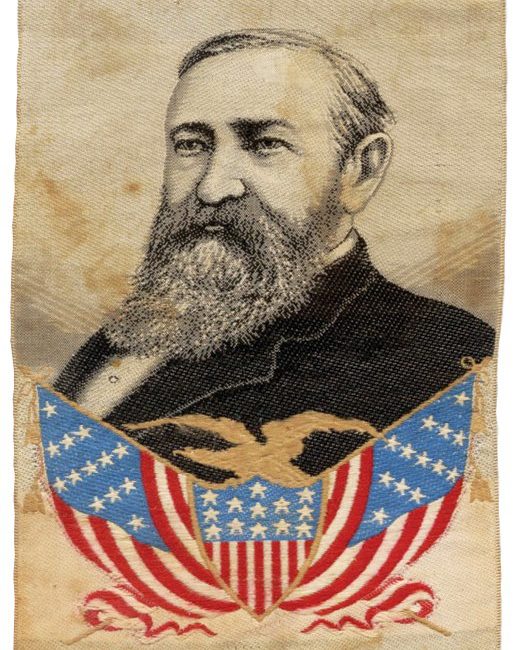
Political Campaigning from 1888, Benjamin Harrison’s “Front Porch” Campaign
Presidential races of yesteryear were a strange game. No endless cacophony of radio and television spots, no ceaseless stream of social media sound bites. But in the case of Hoosier candidate Benjamin Harrison, you could catch a speech—if you came to him. You didn’t need an arena or convention center, a private plane or titanic travel budget—just show up with an entourage and knock on the front door of the retired Civil War General.
Campaigning wasn’t really a “thing” until Harrison’s grandfather William Henry Harrison got the ball rolling with a political tour of sorts—nothing major, just a few stops and a vague platform shared while running for the nation’s highest office in 1840. For the 1880 election, James Garfield gave speeches from his front porch to those insistent on hearing from the presidential nominee. In 1888, “Little Ben” (a moniker given by the opposing party) followed suit, opting for the “front porch” campaign.
Benjamin Harrison addressed more than 300,000 people in 80-plus speeches from his compact front porch (and, in a couple of instances, University Park), attracting throngs of visitors to Indiana’s capital. Hundreds of boisterous men would spill into the street from Union Station and head north. Bass drums thumped in lockstep with the horde, and a cannon thundered as the crowd marched toward its destination: a large brick Italianate home on North Delaware Street.
A number of ruffians, desirous of a memento, snapped off pickets from the candidate’s fence.
Seen here during one of those orations, men and boys, both white and black, crowded the Harrisons’ front lawn. The Republican nominee himself, who would go on to become the 23rd U.S. president (and, to this day, the sole Hoosier to hold that office for a full term), stands on a step below his front door, looking toward the camera. The downside of having the crowd come to the candidate instead of the candidate coming to the crowd: A number of ruffians, desirous of a memento, snapped off pickets from the candidate’s fence. The discarded beer bottles of today’s average tailgater don’t seem so bad.
Overall, Harrison’s political career was erratic. He ran for Indiana governor on the Republican ticket in 1876, but lost. He represented Indiana as a U.S. senator from 1881 to 1887, then lost his seat, only to gain the Republican nomination for president the following year. Politics weren’t for the faint of heart then, either.
Tiffany Benedict Browne runs historicindianapolis.com. The Harrison Home is one of her favorite Indy museums.





